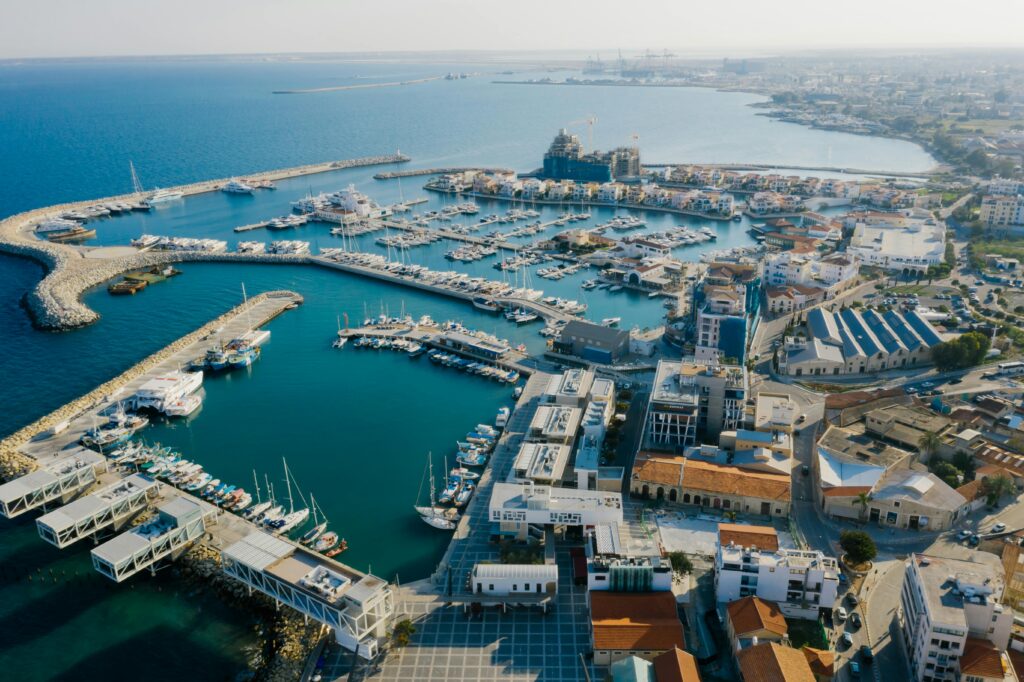Edit Content
Edit Content
Edit Content
Edit Content
Edit Content
Edit Content
Settled for more than 10 millennia, Cyprus stands at a cultural, linguistic, and historic crossroads between Europe and Asia. Cyprus is a popular tourist destination for visitors from Europe, birdwatchers drawn by the island’s diversity of migratory species, and other vacationers. Cyprus imports all the petroleum needed to power vehicles as well as to generate electricity, which is produced by thermal power stations. The country also continues to be one of the world’s major producers of solar energy. The Central Bank of Cyprus issues the Cyprus pound, while Turkish lira are circulated in the Turkish-occupied area. Light manufactures, particularly clothing and footwear, and foodstuffs, including potatoes and citrus fruit, constitute the republic’s major exports. Petroleum, petroleum products, foodstuffs, and machinery are the chief imports. Cyprus has been a member of WTO since 30 July 1995 and a member of GATT since 15 July 1963. As of 1 May 2004, it is a member State of the European Union.

Starting a business in Cyprus is the best way to do business in the EU. The country offers many opportunities to reduce your tax exposure and optimize your taxes. Cyprus has become an essential destination for companies looking for a legal way to optimize their taxes.
The fact that the laws and regulations for foreign investors are the same as for local investors
makes it even better. Cyprus has four main types of corporate structures:
Cyprus PIT is imposed on the worldwide income of individuals who are tax residents in Cyprus. Individuals who are not tax residents of Cyprus are taxed only on certain types of income accrued or derived from sources in Cyprus.

The following table lists the PIT rates and currently applicable to individuals:
SDC is imposed only on dividend, interest (most types), and rental income earned by individuals who are both Cyprus tax resident and Cyprus domiciled for the purposes of the SDC.
All companies that are tax residents of Cyprus are taxed on their income accrued or derived from all sources in Cyprus and abroad. A non-Cyprus tax resident company is taxed on income accrued or derived from business activity that is carried out through a PE in Cyprus and on certain other income arising from sources in Cyprus. The standard corporate income tax rate in Cyprus is 12.5%. The Cyprus corporate income tax law explicitly provides for several exemptions for many and varied types of incomes, profits, and gains.
SDC is imposed only on non-exempt dividend income, ‘passive’ interest income, and rental income earned by Cyprus tax resident companies and Cyprus PEs of non-Cyprus tax resident companies. Non-tax residents of Cyprus with non-Cyprus PEs are exempt from SDC. Interest received by close-ended or open-ended collective investment schemes (CISs) is never
subject to SDC as it is considered as ‘active’ interest income and is subject to CIT. Gross rental income reduced by 25% is also subject to SDC at the rate of 3% (i.e. effective rate of 2.25%) in addition to CIT (after deducting allowable expenses) of 12.5%.
Followings are the most common forms of business entities in Cyprus:
In Cyprus this type of company, also called an LTD, can either be public or private, depending on the types of shares and the size of the corporation.
A private limited liability company is not imposed with a minimum amount of money, however, in the case of a public company, the minimum share capital is approximately 25,629 euros.
There are two types of partnerships available for registration in Cyprus – the general and the limited partnership. These are not considered separate business entities from their owners. Both types of partnerships require a minimum number of two participants and a maximum number of 20 participants.

This is the simplest business form available for those who want to operate on their own. There are no share capital requirements in the case of sole traders.
This is the most common type of company used in Cyprus and it is founded by one or more partners – up to 50. Other important requirements for setting up a private limited liability company are a local address and a secretary. The shareholders subscribe shares, monetary or non-monetary, which are given a nominal value and cannot be transferred. The members of a private company limited by shares are liable to the company’s debts and obligations only to the extent of the nominal value of their shares.

Public company limited by shares functions the same as a private company limited by shares, except those shares are freely transferable and there is no restriction as to the maximum number of partners. It must also have at least 7 shareholders. The minimum share capital of a public company limited by shares is 25,629 euros.
These legal forms are available for any foreign company interested in entering the Cypriot market. These can be set up as separate entities from the parent company (Cypriot companies having the foreign company as shareholder) or extensions of the parent-company in Cyprus. Also, subsidiaries are a popular option of entering the Cypriot market.

We have a team of professionals to help you with all your business needs. So, that you can focus on business expansion in Cyprus.
Please feel free to email us on enquiries@chandrawatpartners.com
Settled for more than 10 millennia, Cyprus stands at a cultural, linguistic, and historic crossroads between Europe and Asia. Cyprus is a popular tourist destination for visitors from Europe, birdwatchers drawn by the island’s diversity of migratory species, and other vacationers. Cyprus imports all the petroleum needed to power vehicles as well as to generate electricity, which is produced by thermal power stations. The country also continues to be one of the world’s major producers of solar energy. The Central Bank of Cyprus issues the Cyprus pound, while Turkish lira are circulated in the Turkish-occupied area. Light manufactures, particularly clothing and footwear, and foodstuffs, including potatoes and citrus fruit, constitute the republic’s major exports. Petroleum, petroleum products, foodstuffs, and machinery are the chief imports. Cyprus has been a member of WTO since 30 July 1995 and a member of GATT since 15 July 1963. As of 1 May 2004, it is a member State of the European Union.
Throughout the past 30 years, Cyprus has developed to become a high-quality centre for international business and investment. The past decade has witnessed a steady stream of companies choosing to set up their headquarters in Cyprus. There are many benefits to setting up a business in Cyprus.
Cyprus offers many investment opportunities. It is one of the most touristic countries in the Mediterranean and Europe as a whole; it is one of the global shipping powers; it has a thriving real estate business, and its financial business still has a ton of room to grow. There are also other opportunities in gas, agricultural and fishing.
Cyprus is a popular destination for businesses that are starting to operate in Europe. In a continent where there’s so much fiscal and bureaucratic pressure, Cyprus is a breeze of fresh air. Starting and running a business is simple. If any person wishes to start a financial business, financial licenses in Cyprus are reputable offering peace of mind for investors and have passporting rights. It means a person can choose Cyprus as European headquarters to operate his business without any additional licensing requirements for other EU members or needing to establish branches or offices.
The government took many business initiatives. For example, it introduced many tax incentives, opened the country to investors, established an attractive non-dom status for foreigners and provided tax credits for fund managers. It also created citizenship and residency by investment programs, and reformed banking laws so that banks could securitize loans, reducing their NPL exponentially.
When compared to the services and easy life offered by the country, its cost of living is among the lowest in the European Union. The country has a modern infrastructure with great telecommunications. As per Knight Frank report, one of the world’s leading real estate consultants, all this led to Cyprus being named the 5th best relocation destination in the world.
Therefore, the country has the second-highest percentage of foreigners in the EU, with almost 20%.
Starting a business in Cyprus is the best way to do business in the EU. The country offers many opportunities to reduce your tax exposure and optimize your taxes. Cyprus has become an essential destination for companies looking for a legal way to optimize their taxes.
The fact that the laws and regulations for foreign investors are the same as for local investors
makes it even better. Cyprus has four main types of corporate structures:
Cyprus PIT is imposed on the worldwide income of individuals who are tax residents in Cyprus. Individuals who are not tax residents of Cyprus are taxed only on certain types of income accrued or derived from sources in Cyprus.
The following table lists the PIT rates and currently applicable to individuals:
SDC is imposed only on dividend, interest (most types), and rental income earned by individuals who are both Cyprus tax resident and Cyprus domiciled for the purposes of the SDC.
All companies that are tax residents of Cyprus are taxed on their income accrued or derived from all sources in Cyprus and abroad. A non-Cyprus tax resident company is taxed on income accrued or derived from business activity that is carried out through a PE in Cyprus and on certain other income arising from sources in Cyprus. The standard corporate income tax rate in Cyprus is 12.5%. The Cyprus corporate income tax law explicitly provides for several exemptions for many and varied types of incomes, profits, and gains.
SDC is imposed only on non-exempt dividend income, ‘passive’ interest income, and rental income earned by Cyprus tax resident companies and Cyprus PEs of non-Cyprus tax resident companies. Non-tax residents of Cyprus with non-Cyprus PEs are exempt from SDC. Interest received by close-ended or open-ended collective investment schemes (CISs) is never
subject to SDC as it is considered as ‘active’ interest income and is subject to CIT. Gross rental income reduced by 25% is also subject to SDC at the rate of 3% (i.e. effective rate of 2.25%) in addition to CIT (after deducting allowable expenses) of 12.5%.
Followings are the most common forms of business entities in Cyprus:
In Cyprus this type of company, also called an LTD, can either be public or private, depending on the types of shares and the size of the corporation.
A private limited liability company is not imposed with a minimum amount of money, however, in the case of a public company, the minimum share capital is approximately 25,629 euros.
There are two types of partnerships available for registration in Cyprus – the general and the limited partnership. These are not considered separate business entities from their owners. Both types of partnerships require a minimum number of two participants and a maximum number of 20 participants.
This is the simplest business form available for those who want to operate on their own. There are no share capital requirements in the case of sole traders.
This is the most common type of company used in Cyprus and it is founded by one or more partners – up to 50. Other important requirements for setting up a private limited liability company are a local address and a secretary. The shareholders subscribe shares, monetary or non-monetary, which are given a nominal value and cannot be transferred. The members of a private company limited by shares are liable to the company’s debts and obligations only to the extent of the nominal value of their shares.
Public company limited by shares functions the same as a private company limited by shares, except those shares are freely transferable and there is no restriction as to the maximum number of partners. It must also have at least 7 shareholders. The minimum share capital of a public company limited by shares is 25,629 euros.
These legal forms are available for any foreign company interested in entering the Cypriot market. These can be set up as separate entities from the parent company (Cypriot companies having the foreign company as shareholder) or extensions of the parent-company in Cyprus. Also, subsidiaries are a popular option of entering the Cypriot market.
Settled for more than 10 millennia, Cyprus stands at a cultural, linguistic, and historic crossroads between Europe and Asia. Cyprus is a popular tourist destination for visitors from Europe, birdwatchers drawn by the island’s diversity of migratory species, and other vacationers. Cyprus imports all the petroleum needed…
Author: Chandrawat & Partners
Topic: Doing Business in Cyprus
Get in touch with the right people to get the right help in setting up your business in Cyprus.
Contact us at: enquiries@chandrawatpartners.com
Chandrawat & Partners is a prominent full-service firm dedicated to delivering top-tier professional services to clients both within the domestic and international spheres.
Copyright © Chandrawat & Partners. All Rights Reserved.
Copyright © Chandrawat & Partners. All Rights Reserved.
Chandrawat & Partners stands as a dynamic and rapidly expanding full-service firm, specializing in the delivery of exceptional professional and corporate services to a diverse clientele, both foreign and local. We proudly represent companies and individuals across a wide spectrum of sectors through distinct entities established in various countries worldwide.
Chandrawat & Partners stands as a dynamic and rapidly expanding full-service firm, specializing in the delivery of exceptional professional and corporate services to a diverse clientele, both foreign and local. We proudly represent companies and individuals across a wide spectrum of sectors through distinct entities established in various countries worldwide.
ASIA
AFRICA
EUROPE
NORTH AMERICA
SOUTH AMERICA
OCEANIA